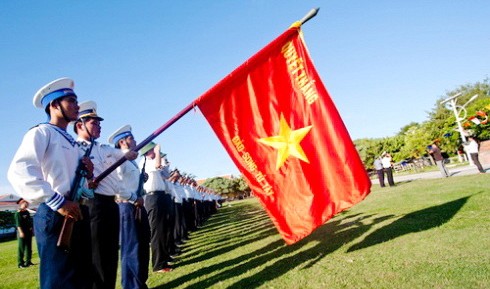For centuries, Vietnam has established and exercised its sovereignty over Truong Sa (Spratly) and Hoang Sa (Paracel) archipelagos in a peaceful and continuous manner. Therefore, any use of force to occupy them blatantly violates the United Nations Charter and related international laws, a Vietnamese professor said.
Assoc. Professor Dr Pham Dang Phuoc, headmaster of Pham Van Dong University, made the statement at an international seminar held in the central province of Quang Ngai last weekend, on April 27 and 28.
At the event, more than 50 delegates, who are researchers and scholars from the US, Russia, Canada, Sweden, Australia, India, South Korea, the Philippines and Vietnam, shared the view that Vietnam has established and exercised its sovereignty over the two archipelagos peacefully and continuously and in line with international law.
China’s use of force to occupy Hoang Sa archipelago in 1974 and several shoals on Truong Sa archipelago in 1988 was an absolute violation of international law, they said.
Cow’s tongue: a big mistake
Citing a 43-page study, Professor Dr. Ta Van Tai, hailing from Massachusetts, USA, provided legal and historical evidence to prove that China’s cow’s tongue line, also called the “nine-dotted line,” which claims China’s sovereignty over about 80 percent of the East Sea, including Vietnam’s Hoang Sa and Truong Sa Islands, is groundless.
It is very wrong for China to announce the cow’s tongue and many Chinese scholars have failed to explain it when they were questioned at diplomatic conferences or forums or by other researchers, Tai said.
With the same view, Pham Hoang Quan, a researcher of ancient Chinese archives, presented at the seminar a 22-page report to provide an overview of the Chinese historical documents related of the East Sea.
“In Chinese history, none of the Chinese monarchies from the Han to the Qing dynasty established their sovereignty in the East Sea, thus confirming that China’s southernmost territory ends with Hainan Island,” Quan said.
Tran Cong Truc, former head of the Government’s National Boundary Commission, said the fact that Vietnam is the first nation in history to occupy and exercise its sovereignty over Hoang Sa and Truong Sa in an actual and continuous manner was highlighted by scholars at the seminar.
“Tribunal solution” supported
Russian Professor Dmitri Valentinovich Mosyakov, from the Russian Academy of Sciences, said that the fact that the Philippines has taken steps to take China to an international court over their territorial dispute is a radical measure and a strong policy.
Sharing the same view, Dr. Nguyen Nha from the Vietnamese Historical Association said, “Vietnam has enough historical and legal evidence of its sovereignty over the two archipelagos. Therefore, countries that support this have suggested that Vietnam bring the territorial dispute to an international court.”
Similarly, Professor Tai said that if Vietnam could not settle the dispute through negotiations, it should bring China to an international court, in accordance with the regulations of the United Nations Convention on the Law of the Sea (UNCLOS). He added that Vietnam should exercise international laws to safeguard its sovereignty over its seas and land.
Professor Nguyen Quang Ngoc from the Vietnam Historical Science Association said, “It is certain that there will be no international tribunal that recognizes China’s cow’s tongue line, since such a line is not based on any legal foundation.”
Vietnam’s evidence of its sovereignty over the two archipelagos is very clear and this is an important foundation for the country, which is struggling to execute its sovereignty over the islands, he said.
























































